A long-running attempt to have Net Income Stabilization Account changes declared improper could be headed back to court.
Sander Holdings, Donald Patenaude and Mathew Nagyl want their case, which has already been heard in a number of courtrooms, certified as a class action.
A federal court judge last year dismissed their application and they are now working on an appeal.
Saskatoon lawyer Terry Zakreski said the process stems from a case known as Boyko.
That case, initiated in the late 1990s, saw Farm Business Consultants Inc. clients John and Jean Boyko of Raymore, Sask., ask for a judicial review of NISA’s point of sale guidelines, which did not include freight and handling costs when calculating NISA contributions.
Read Also

Prairie spring wheat looks like a bumper crop
Canada will likely set a new record for spring wheat yields this year, topping the previous mark of 54.1 bushels/acre – set in 2020
The federal court denied the judicial review and the appeal court upheld the decision.
However, Zakreski explained that the judge at the time said the decision “wouldn’t stop people from seeking remedy.”
The Boyko case focused on the argument that 1994 changes to NISA guidelines were implemented after an improper vote.
Quebec was allowed to vote even though it hadn’t formally signed the NISA agreement, while British Columbia, Alberta, Saskatchewan, New Brunswick and Prince Edward Island all voted against the agreement.
Two-thirds of participating provinces representing 50 percent of eligible net sales are considered a majority under the NISA agreement.
In 2004 in the Sanders, Patenaude and Nagyl case, federal judge Konrad von Finckenstein ruled there was nothing improper with how the guidelines were changed, saying the clause requiring the majority did not apply to the NISA committee.
The farmers successfully appealed that decision and they came before von Finckenstein again in 2005 to ask for a certified class action suit. He dismissed the application.
Zakreski said the applicants want farmers to receive the money they are entitled to from a program that was supposed to be for their benefit.
He noted that a farmer in Saskatoon who had a farm identical to one in Thunder Bay would receive less money under the NISA guidelines because of the distance to port.
Farmers must be allowed to declare their expenses as deductions, he said.
“It’s inconsistent with what the Income Tax Act says you’re supposed to do with these type of expenses,” he added.
No date has been set for the appeal to be heard.

















